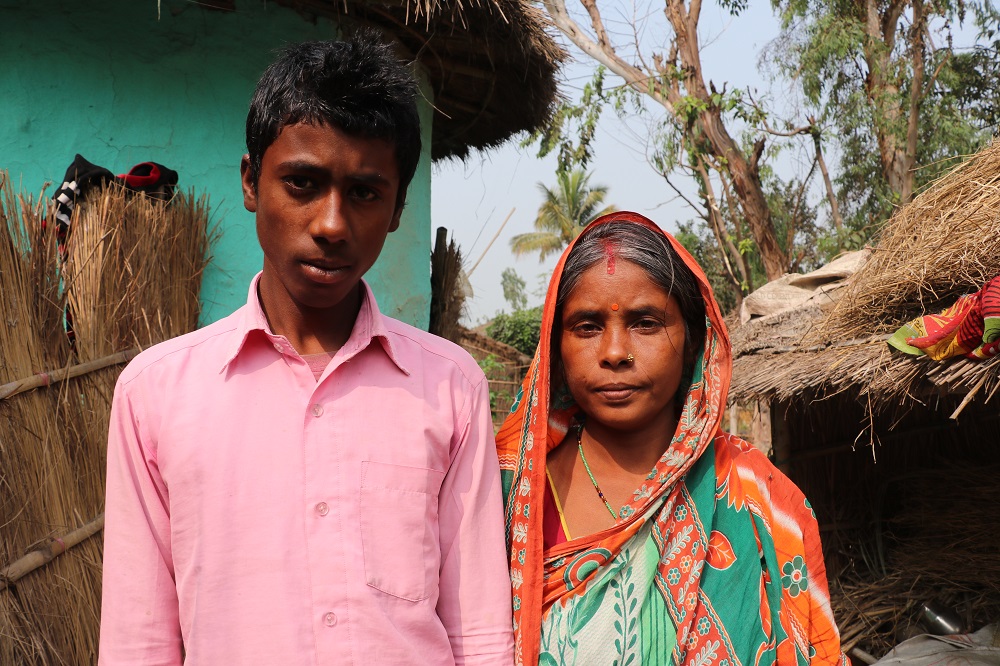In South Asia and many other impoverished parts of the world, there are millions of people trapped in bonded labour, which is also known as debt bondage or debt slavery. It is the most common but least known form of modern day slavery.
People experiencing forced labour often become subject to debt bondage, in which they are trapped in a cycle of labour. It usually begins when poor people have no choice but to take a loan or wage advance from their employer or member of the community to cover emergency or major expenditures such as dowries. They subsequently find it impossible to repay the loan for a combination of reasons, including high interest rates and low pay. Often they are forced to work in harsh conditions.
Kirin’s story
All three of Kiran’s sons are survivors of child labour. The mother-of-four, who lives in Nepal’s Rauthat district, tells her story.
“I cannot read and write. My parents could not afford to send us all to school, so they chose to send my eldest brother.
“I got married when I was 14, my husband was 19. My parents could not afford the dowry for an educated and economically stable man, so they arranged for me to marry my husband who is also illiterate and comes from a poor family.
“We struggled a lot, particularly during and after my pregnancies. There were times we did not have enough food and water. I became very sick and I could not produce enough milk, so we had to give the baby formula milk. The children were very weak and sick because there was not enough food. I often went hungry so that I could feed my children. The hospital was very far away and we could not afford take them to hospital.
“Things started to improve when my husband began working at the brick factory and he started to earn a bit of money – but it still was not enough to cover everything we needed. Then my three sons started working at brick factories.

“Manish worked in a brick factory in Kerala, India. He worked very long hours, often with little food and he didn’t always get enough money to send home. He had a lot of debt to pay back so he worked a lot to try and pay it back but the interest rate was very high. He ran away from the factory and when he came back to home he was very thin and weak. He is still very sick and he can’t work anymore so he stays at home. As a mother, it makes me very sad. It is difficult for me to see him in this condition.
“In 2016, my daughter Priyanka got married to a brick factory worker from Kathmandu. Her in-laws asked for 200,000 rupees (£1,300) for the dowry. We ended up contributing 150,000 rupees (£1,000) and some gold pendants. We also had to collect 30,000 rupees (£200) for the wedding day. It was very difficult to get all of these funds together: all of my sons and my husband contributed towards the dowry but it was not enough so we got a loan, 20,000 rupees, with about 30% interest. We have paid back 10,000 rupees so far. We have 16,000 to pay back and it keeps increasing every year.
“On the wedding day, my son in law said he was not attracted to my daughter because she is dark skinned but the wedding went ahead anyway and the groom accepted the dowry. A year after the wedding, my daughter’s in laws started to abuse her and my family because she had difficulty getting pregnant. Once the neighbours found out that she has still not gotten pregnant, they also started to abuse me and my family; they started to blame me for all the problems.
“My daughter’s husband has started having an affair and is no longer engaged in improving the marriage but he does not want to divorce my daughter. We are planning to file a case so that we can get the divorce and get the dowry back from her husband. I want my daughter to remarry but we cannot afford the dowry, we need to first get 200,000 dowry back from her current husband. It’s a very difficult situation.
“Women in this community suffer a lot. A lot of us are illiterate, we cannot inherit property and we only get financial support through our husbands. I want to see a lot of changes, I want more job opportunities for women so they can become financially independent. A lot of women suffer health complications especially during birth because all the health centres and hospitals are far away or they cannot afford it.”
Kirin has found a lifeline through our project with local partner the Rural Development Centre. Working together to reduce child labour and human trafficking, we’re supporting vulnerable families like Kirin’s. Her youngest son, Sang*, is receiving skill-based training designed to help him build a future free from exploitation and poverty.
Donate now to support our life-changing work in Nepal and around the world.
*Name changed to protect his identity










